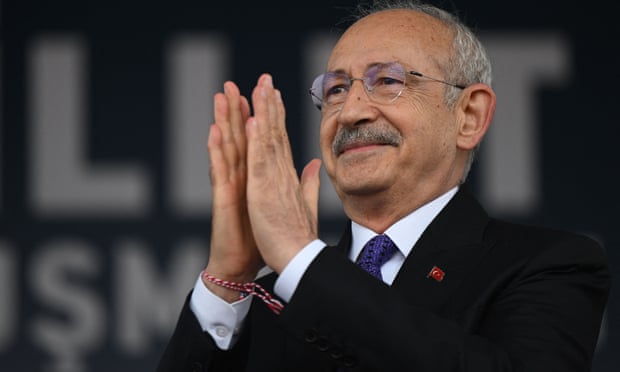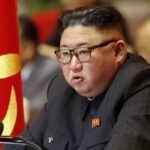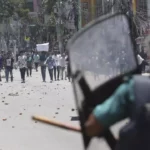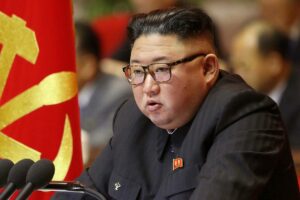Toppling the president and his AKP party in May is no longer unthinkable. But voters in Ankara seem finely balanced
On the outskirts of the Turkish capital in a contested electoral district, two young voters tussled over the approaching election in a dessert shop, the smell of sugar and hot butter wafting through the air. Iflah Oluklu, a skinny 23-year-old with bleached hair, black jeans and a fitted black T-shirt, chastised his friend for disrespecting some supporters of the Turkish president while they were playing an online video game.
The two friends are split in their allegiances. Oluklu described himself as a nationalist, and said he intended to support Recep Tayyip Erdoğan in a tightly contested presidential election on 14 May. “Erdoğan is like a father figure for us in Turkey. He’s been running the country for 20 years. I don’t think it’s impossible to remove him as leader, but especially among this opposition, there’s no one who can replace him,” he said.
His friend Kaan, a longtime supporter of the main opposition Republican People’s party (CHP), who declined to give his surname, quietly disagreed. “I just don’t think this country is governed well, and I want people’s voices to be heard by those in power,” he said. “I really think this might be the end for Erdoğan,” he added cautiously. “Or, at least, I hope so.”
After two decades in power, Erdoğan is facing a concerted challenge. Polls show his main rival, Kemal Kılıçdaroğlu, a former accountant and longtime bureaucrat, has a slight edge. The vote presents a stark choice for the Turkish public, between Erdoğan and the possibility that re-electing him will entrench one-man rule, or his opponents who have promised to overhaul the presidential system and return Turkey to parliamentary democracy.
Turkey’s opposition, a six-party coalition headed by Kılıçdaroğlu and united by the sole aim of removing Erdoğan from power, believes that the problems facing the country should make this choice easy. A deep economic crisis and a lacklustre government response to two powerful earthquakes that struck the country in February have capped 20 years under Erdoğan and his Justice and Development party (AKP), which appears poised to suffer losses in parliamentary elections held in tandem with the vote for president.

Kaan’s father, Hasan, smoothed the fine mesh of net curtains hanging in his fabric shop next to Oluklu’s dessert shop as he explained why he won’t be voting for either the AKP or Erdoğan for the first time in his life. “It’s simple: he took all the money out of my pocket,” he said. “The fabric we sell here, for us to buy it wholesale costs five times more than before. But my rent has more than doubled.”
Hasan’s views on the economy are matched by the pro-business Democracy and Progress party (Deva), led by a former senior AKP official who is now a member of the opposition coalition. “The situation regarding this economy is clear, as well as the experience of this presidency. Look at the economic indicators – inflation, income distribution, poverty. All of this has deteriorated significantly under this presidential system,” said İbrahim Çanakcı, a Deva cofounder and former Turkish treasury official.
“Erdoğan used to blame ministers, institutions or foreign forces. But now people see clearly that when it comes to this system of one-man rule, that means there’s only one person responsible for this outcome,” he said.
But putting an abrupt end to two decades of rule by both Erdoğan and the AKP is no simple task. While many polls indicate the opposition coalition could gain a majority in the parliament, the race for the presidency remains tight. Without winning both the presidency and the parliament, the opposition will be unable to enact the sweeping constitutional reforms they have promised. The risk that Erdoğan could hang on as president even if his party suffers a defeat in parliament could further concentrate power around the presidency, cancelling out any opposition gains.
Onursal Adıgüzel, a deputy and fierce supporter of Kılıçdaroğlu, was unconcerned. Speaking from a makeshift opposition campaign office decorated with beatific posters of Kılıçdaroğlu meeting farmworkers and young people, he said CHP would triumph by targeting pensioners and elusive undecided voters.
“Personally, I believe it will be easier for us to win the presidential election than the parliamentary vote,” he said. “Two years ago, Kılıçdaroğlu wasn’t considered a strong rival for Erdoğan and now he’s leading in the polls. But, most of all, he’s a person who can deliver peace to Turkey, and he’s not using polarising language like Erdoğan.”
Asked to define the appeal of Kılıçdaroğlu’s candidacy, most voters and members of his coalition said he provided an alternative to Erdoğan and represented change. Few managed to articulate what might encourage undecided voters or lifelong Erdoğan supporters to choose him. The 74-year-old bespectacled politician has also faced public criticism from his main coalition partner, the nationalist IYI Parti (Good party), that he muscled his way to the candidacy, forcing others out of the running despite polls showing that every other potential option stood a better chance of beating Erdoğan.
“Erdoğan will lose and Kılıçdaroğlu will win this election – we’re confident in that,” said Çanakcı. “The decision about the candidate is already made. There’s no use questioning how fitting Kılıçdaroğlu is. In our view, he fits the position perfectly.”
Uğur Poyraz, general secretary of the IYI party, said their hesitancy about Kılıçdaroğlu’s candidacy was because of the high stakes of this election, where Turkish democracy was on the line. “Our position on the candidate is about our position on victory, and ultimately this is about the good of our country,” he said.
As for how they plan to topple a president who had built up a cult of personality over two decades, Poyraz said he believed that reality would work in their favour, and that the Turkish public no longer trusted Erdoğan or his party. His IYI party will contest every seat in the hope of winning over what they see as a silent majority of AKP voters who are ready to defect.
“Our problem is not with any one individual, it’s about a system that is tainting every aspect of Turkish society. It’s that system we’re setting out to change, not a person we’re fighting … The public is by and large convinced that it’s time for this government to change, that it’s irredeemable, incurable and that there is no redemption for them,” he said.
Not all voters are convinced. For those like Oluklu’s cousin Kamuran Özcip, who has voted Erdoğan in every single election in his adult life, the prospect of ending the president’s rule is impractical. “I like Erdoğan, maybe it’s his politics, maybe it’s his personality. He’s a really experienced statesman,” he said, pointing up at a television showing news of the president’s latest speech in their family’s dessert shop.
Özcip was baffled by the opposition’s offer of radical change. He’d prefer, he said, to hope that Erdoğan could improve things. “There are some minor problems, with the economy, with people being unable to speak, or people being sent to jail. If Erdoğan changed these things, life wouldn’t be perfect, but it would improve,” he said. “Everyone wants change, and honestly I don’t know what they’re thinking. If Kılıçdaroğlu wins the election, it’s completely unpredictable,” he added.
His nephew Oluklu leaned across the table with a gentle smile. The opposition, he said, misunderstands voters like him who support Erdoğan and his coalition. “People talk about us, those who vote for Erdoğan and the AKP like we’re sheep, as if we vote for them blindly. But that’s not the case at all, we have free choice and we vote accordingly,” he said.
Source: The Guardian















